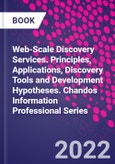Web-Scale Discovery Services: Principles, Applications, Discovery Tools and Development Hypotheses summarizes and presents the state-of-the-art in WSDS. The title promotes a middle-way between finding the best tool for each particular need and the search for the most reliable systems. The title identifies basic theoretical problems and offers practical solutions for librarians. The volume offers a summary of ideas from around the world, giving a new perspective that is backed up by strong theory. Offering a vision for libraries, this book also allows archivists, museum specialists, computer scientists, commercial operators and interested users to deepen their culture and information literacy.
The great number of information sources now available and the changing habits of web users has led to the development of Web Scale Discovery Services (WSDS). The goal of these systems and techniques is to make catalogues, databases, institutional repositories, Open Access archives and other databases searchable and discoverable through a single point of access. The diffusion of systems and connections between data disseminated by libraries and published by other institutions poses a challenge to understanding discovery in the modern library.
Please Note: This is an On Demand product, delivery may take up to 11 working days after payment has been received.
Table of Contents
Part One1. Evolution of the search systems
1.1 The innovation of the OPACs
1.2 Search, interaction and discovery
1.3 The technologies of discovery systems
2. The search and discovery tools
2.1 Definition and disambiguation of tools and resources
2.2 Tabs of the major discovery systems
2.3 Viewing data in catalogs and discovery systems
Part Two
3. Principles and theories
3.1 The linked data methodology
3.2 Potentiality and criticality of the new methods
3.3 New definitions of resource
4. Information discovery and information literacy
4.1 Information retrieval and discovery
4.2 Discovery tools and information literacy
4.3 Information literacy and people








